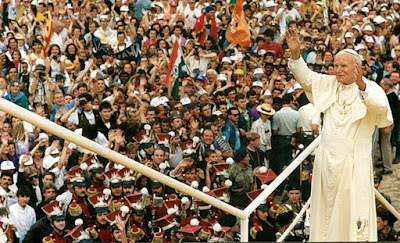Note: I didn't preach this homily today. Our celebrant decided to preach instead, which is his prerogative. It's no big deal since I always have a homily ready whenever I assist at Mass as the deacon. Sometimes I'm asked to preach, and sometimes I'm not. Anyway, this unpreached homily follows:
_____________________________
Readings: 2 Cor 8:1-9; Ps 146; Mt 5:43-48
_____________________
On Sunday, one of my sons posted a
Father’s Day note on Facebook. He began with a bunch of nice words about me,
and then he added: “He wasn’t perfect, and he never said he was, unless he was
joking.”
I wasn’t sure what to make of that,
but it got me thinking of what Jesus told us in today’s Gospel passage from the
Sermon on the Mount.
“So be perfect, just as your heavenly Father is perfect."
I suspect these words have made a lot of Christians suddenly pay attention and scratch their heads. Did He really mean that? How can we, these obviously imperfect beings, be perfect. Yes, indeed, Jesus sure can make life difficult, can’t He?
Back when we were young and doing well in the world, a lot of us thought we were…well, if not perfect, at least pretty good. I remember the first time I realized I harbored some major imperfections – things that separated me from what God wanted for me.
I was a Navy pilot during the war in Vietnam. At the time, I flew search and rescue helicopters. All I wanted to do was pickup American pilots who’d been shot down, and get them to safety. But at the time, the Communists of both North Vietnam and the Viet Cong were doing their very best to kill me. And here’s Jesus telling me to “love your enemies.” Let me tell you, that ain’t so easy when they’re shooting at you. Yes, they were an easy enemy to hate. But hating them troubled me because I knew what Jesus had commanded of us.
And
so, one day I paid a visit to the Catholic chaplain and asked how we could
reconcile loving our enemies with this conflict in which we were engaged.
I’ll always remember that conversation. I won’t
go into our rather lengthy discussion on the just war doctrine. That’s a
subject for another time. But I will tell you what this young priest had to say
about enemies and hatred and love and forgiveness.
He began
by saying that if our enemies are those we hate, we have ceased being
Christians. As disciples of Jesus Christ, we are to hate no one. But if our
enemies are those who hate us, then we will always have enemies. After all, Jesus
had many enemies because He did the Father’s will: He spoke the truth and He loved.
He loved all, especially those despised by the world, and He spoke the truth
even when it upset people.
Our enemies decide how they will treat us. We decide only to love them or hate
them. Love and hate, then, are not emotions. They’re decisions. Jesus calls us
to love regardless of the evil others do. And He calls to exclude no one from
our love.
These are
hard words for us, aren’t they? Hard indeed…until we come face to face with the
Cross, and we hear His words:
“Father,
forgive them, they know not what they do” [Lk 23:34].
There, on
the Cross, we encounter Divine Mercy: God’s perfect love, a love that demands
forgiveness. Forgiveness is the only thing we can do to those we are called to
love. If we refuse to forgive, we refuse to love.
About 30 years ago I saw the movie, “Dead Man Walking” about a convicted killer named Robert Willie who'd been sentenced to death. Well, one person you won’t see in the
movie is Debbie Morris, the one victim who miraculously survived her horrific
ordeal at the hands of Willie. After Willie’s execution, she said,
“Justice didn’t do a thing to heal me. Forgiveness did.”
Yes, it’s
easy to hate and scream for justice, for man’s justice, but it never really brings
healing, or the so-called "closure" the world promises. Only forgiveness does
that. Only forgiveness heals.
Yes, we
can defend ourselves from evil, but in defending ourselves we must not produce
even greater evils. The world will never run out of objects for our hatred,
especially today when enemies abound. How did Paul put it to the Corinthians:
“…test the genuineness
of your love by your concern for others” [2 Cor 8:8].
After
all, we were created in God’s image and likeness, so He really does call us to
perfection, to live up to His expectations for us, to live up to that image and
likeness. He calls each of us to view this life as a pilgrimage of love, one in
which we seek out others, finding Jesus Christ in each person we meet, and
letting them recognize Jesus in us.
Let God
be the one who will judge His creations. We need only love and forgive. I’ve long
thought this is what Jesus means when He commands us to “be perfect just as
your heavenly Father is perfect.”











